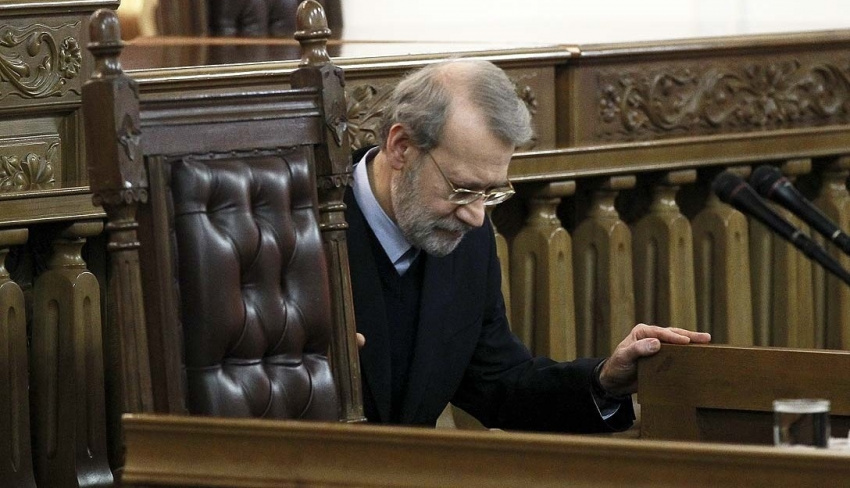The Bleak Political Future of Iran’s Parliamentary Speaker

Thirty months ago, while political parties were fighting over the 2017 presidential election, piling up accusations against each other in the media, parliament speakerr Ali Larijani was standing by, silently observing the struggle between the rivals.
Larijani was at the apex of his influence then, with many political observers believing that the sexagenarian politician was preparing for the 2021 presidential contest.
The post-election tides were not in favor of Larijani however. Like many other so-called moderate figures, Larijani has suffered a decline in his power. Two years to the next presidential election, his future is more uncertain than ever.
In less than four months, Iranians will go back to the polls to vote in their candidates for the 11th post-Revolution parliament. As usual, rumors are circulating around and names come up in the media every now and then.
In the Principlist camp, former speaker of Majles Gholamali Haddad Adel, former chief nuclear negotiator Saeed Jalili, and three-time presidential candidate and ex-mayor of Tehran Bagher Qalibaf are speculated to head the Principlist ticket in Tehran. But it is not clear if Ali Larijani, who has chaired Majles sessions for decade, will run.
Unlike the 2017 election, Reformists are not keen to form an alliance with him, strongly rejecting an option to ally with moderate Principlists and boasting they will not repeat the same mistake twice.. Principlists have not embraced him with open arms either.
Mohammadreza Aref, leader of the Omid (Hope) reformist faction, strongly opposes coalition, though more centrist groups such as the Kargozaran (Executives of Construction) have kept the options open. It is up to question if Kargozaran can convince fellow Reformists to with outsider groups.
Principlists on the other hand have turned into Larijani's adversaries, showing no signs of willingness to enter a partnership with him. Ali Larijani has been the subject of fierce attacks by Principlist media, perhaps as much as Hassan Rouhani.
This September, Larijani had a taste of this opposition in an encounter with Nasrollah Pejmanfar, hardliner Principlist MP and a key figure of Paydari Front over a bill on restoration of the Ministry of Trade. Pejmanfar called Larijani a 'dictator' to which Larijani said in response. "YOU are the dictator, saying and doing whatever you want, with no reprimand or punishment."
"You've become used to shouting your way forward," he retorted.
Larijani's small coterie also seems confused. Their plans to establish a party has practically failed, watered down to forming a loose faction in the parliament, with members whose political lines are not solid. The most prominent figure of this faction, Kazem Jalali, will be appointed as Iran's new ambassador to Russia in near future, replacing Mahdi Sanaei, another former legislator.
Jalali has resigned from his post as member of the parliament recently. Another lawyer close to Ali Larijani, Behrouz Nemati, will most likely become head of Iran's diplomatic mission to Italy.
While neither of the appointments have been finalized, both are expected to take place soon.
Known as Ali Larijani's arms, Jalali and Nemati were on Hope electoral slate in Tehran in 2016 election and both made their way into the parliament thanks to the alliance between the Reformists and Principlists.
Kazem Jalali has presided over the parliament's research center and Behrouz Nemati is member of the parliament's presiding board. With both probably dispatched to Iran's diplomatic missions in Europe, Larijani may see his maneuverability limited. Other figures close to Larijani have not shown any signs of electoral warmup.
Preparing for 2021 elections?
Unloved among both the Principlists and the Reformists, Larijani will probably retire from the parliament after a three-term service. There are no signs of electoral de-hibernation among Larijani and company and it is not clear what Ali Larijani's plans for his political future are. But a challenge for 2021 presidential election is plausible, despite lack of early signs.
What we have observed in recent months is Ali Larijani's cooperation with president Hassan Rouhani to tackle serious challenges the country is facing. He has abstained from political and electoral remarks, hardly appearing in political events.
But let's not forget that the Larijani family has faced intense political pressure in the last couple of years. Sadegh Amoli Larijani, Ali's brother, the former head of the Judiciary, has been the main target of rumors and accusations, while Ali and other Larijani brothers have not been immune from attacks.
This unfriendly climate may have influenced Ali Larijani's decision to leave the parliament. Larijani's circle had tied their hopes to support from the moderate Rouhani government to win the 2021 presidential election. But only two years into Hassan Rouhani's second term, the moderates are cornered and facing serious criticism from both Principlist and Reformist camps.
During the 2017 presidential election, many believed that Vice President Eshaq Jahangiri's nomination alongside Hassan Rouhani was a stratagem by Larijani's team to tarnish Jahangiri's image and reduce his chances for the 2021 election. Today, neither Jahangiri nor Ali Larijani are promising candidates for the next presidential election.
Rumors are that Larijani and Qalibaf may have planned a division of labor for parliamentary and presidential election where Qalibaf runs for the parliamentary election while Larijani prepares for the 2021 presidential contest. These rumors do not seem solid however, as different permutations of it are circulating in the media, for example a Qalibaf alliance with Saeed Jalili, with the latter running for the parliament and Qalibaf groomed for the fourth time for the presidential post.
But one thing is clear for now. That Larijani has few allies left. Lacking a solid popular base, we have to see what his next move in Iran's political landscape would be.
* This article was originally published in Fararu.

